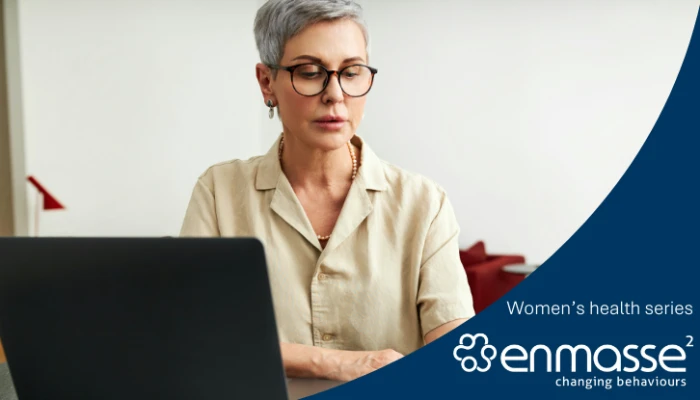Women's health - the essentials
It goes without saying, exercise is vital in maintaining overall health and wellbeing. For working women maintaining a regular physical exercise routine can feel like an additional burden in an already crowded list of demands. Only half Australian women meet the guidelines of 30 mins activity per day and more than 12% are completely sedentary leading to poor health outcomes and chronic disease. Less than 30% of women in the UK undertake muscle-strengthening activities which would improve bone strength and muscular fitness on at least two days week.
All adults need 2.5 to 5 hours moderate intensity exercise per week. This could include some aerobic activity such as brisk walking, swimming, tennis, bike riding, golf or dancing. Remember daily household chores fall into this category as well. If you prefer more vigorous exercise like running, competitive sports or fast cycling you can reduce the time spent to 1.25 – 2.5 hours per week. It is also important to incorporate muscle strengthening activity into your weekly routine to benefit your fitness. Sit ups, push ups, lunges, squats or resistance training are excellent options to build and maintain strength.
It is important to maintain a good level of activity as we get older and it is never too late to start. When embarking on a new exercise regime it is important to consult your doctor, especially if you have existing health conditions. Start slowly and increase intensity of your workouts over time. Major barriers for women to exercise include time pressures and fatigue. Breaking down activity into shorter bursts throughout the day can help overcome these barriers. Also consider how you can incorporate exercise into your daily activities for example a quick 10 minute play in the park with your kids after school or day care pick up. Taking turns with your partner to prepare the evening meal whilst you fit in a walk or run can make a real difference.
Another option is to take advantage of any initiatives offered by your workplace to help reach your exercise goals. Many workplaces have onsite gyms or offer discounts on gym membership or take part in fundraising activities that involve physical activity. In addition, consider how you can incorporate physical activity into your work day. Some workplaces provide onsite yoga or movement classes during work hours. Other ways you can incorporate physical activity in workday include;
- Taking regular breaks away from your desk.
- Requesting a standing desk.
- Scheduling walking meetings, including online meetings.
- Incorporating a 10-minute walk into your commute or ensuring a 10-20 minute walk during lunch if working from home.
- Exploring flexible working arrangements with your manager to help include exercise in your schedule.
Most offices are designed with employee comfort in mind with ergonomic desk and chair design. If you are not comfortable with your arrangement consult with workplace health and safety who may be able to help you make adjustments and provide appropriate equipment. For those working from home, it’s crucial to assess whether your home office meets the same ergonomic standards as your workplace. If improvements are needed, check if your employer can assist with equipment upgrades.
Beyond exercise, several other factors are crucial for boosting women's health:
- Balanced diet: Incorporating a variety of nutrient-rich foods like fruits, vegetables, lean proteins, and whole grains is essential for overall health.
- Adequate sleep: Quality sleep is crucial for maintaining hormone balance, mental health, and immune function. Aim for 7-9 hours of sleep per night to support your wellbeing.
- Stress management: Practices such as mindfulness, meditation, and yoga can reduce stress and improve mental health. Finding time for relaxation and self-care is essential for long-term wellness.
- Regular health screenings: Preventive care, including mammograms, pap smears, and bone density tests, helps detect health issues early. Regular check-ups with your healthcare provider are vital for maintaining health.
- Hydration: Drinking enough water is essential for digestion, skin health, and energy levels. Aim for at least 8 glasses of water a day.
- Healthy relationships: Strong social connections contribute to mental and emotional well-being. Cultivating supportive relationships with family, friends, and colleagues can positively impact overall health.
Additionally, nutrition plays an essential role in maintaining good physical fitness. There are nutrients that are particularly important for women:
- Calcium for bone health and prevention of osteoporosis
- Iron for immunity and prevent fatigue
- Protein for muscle and bone repair and brain health
- Iodine also for brain health, metabolism support, nerves and bone via the thyroid
- Omega-3 fats for brain function, growth and development. Also helpful in reducing the risk of endometriosis plus increasing fertility
- Vitamin D for absorption of calcium, cell growth, immunity and hormone function
- Folate (folic acid) for nervous system, growth and development
- Phytoestrogens for relief of menopausal symptoms
Each of these nutrients can typically be obtained from a balanced diet some people may require supplements to ensure they maintain adequate levels. Speak to your doctor if you have any concerns around your nutritional needs.
Incorporating regular exercise and proper nutrition into your daily routine can greatly enhance your overall health and quality of life. By making small adjustments, such as breaking up your exercise into manageable sessions or utilising workplace resources, you can overcome common barriers and achieve your fitness goals. Additionally, ensuring a well-balanced diet rich in essential nutrients will support your physical and mental wellbeing. Remember, it’s never too late to start prioritising your health - take the first step today and create habits that will benefit you for years to come.
references:
https://www.aihw.gov.au/reports/physical-activity/physical-activity
https://www.frontiersin.org/journals/nutrition/articles/10.3389/fnut.2019.00142/full


